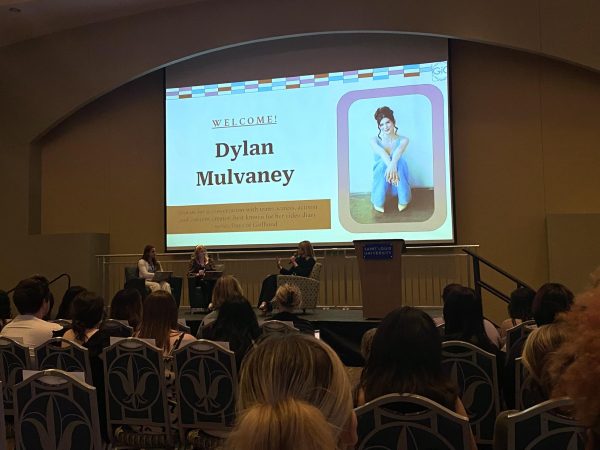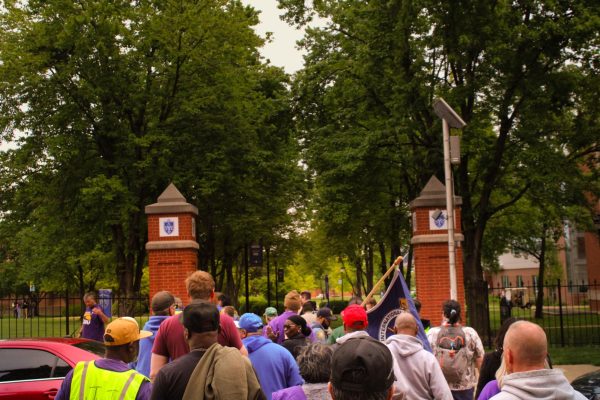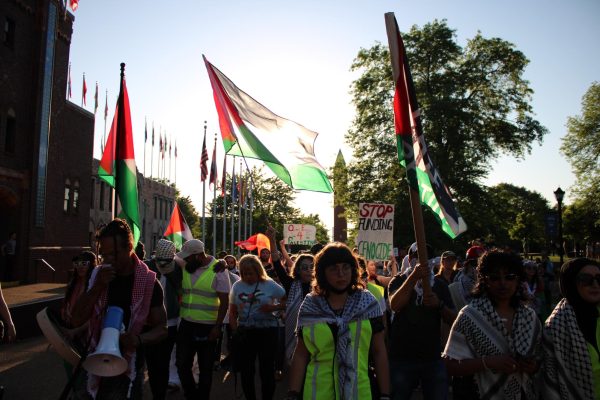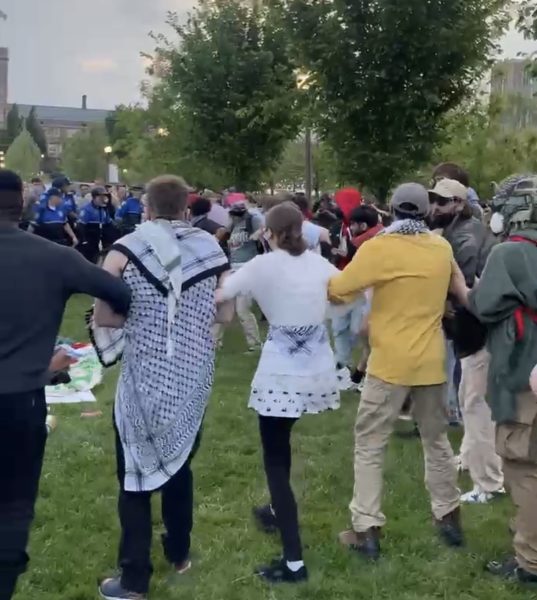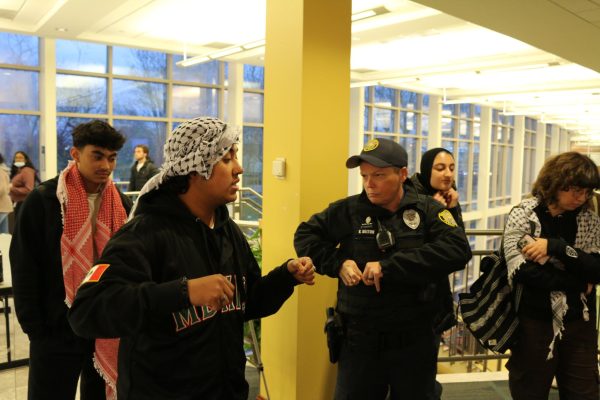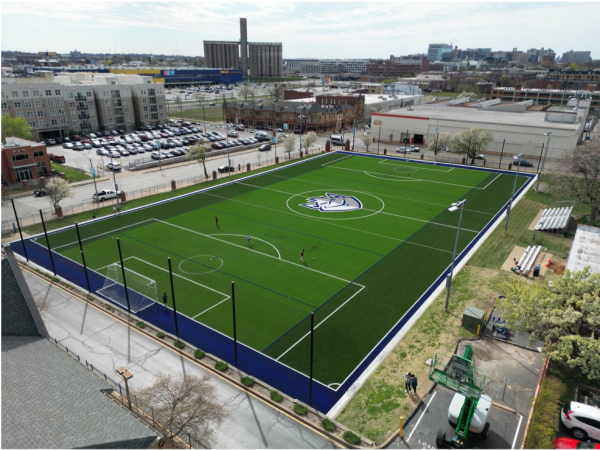A Holy Month of Fasting: How DineSLU Partnered With the Muslim Student Association During Ramadan
DineSLU and the Muslim Student Association (MSA) partnered up for the first time this year to create a new meal service for its practicing Muslims. To accommodate students who would be fasting throughout the month of Ramadan, DineSLU proposed offering a Suhoor service. The goal was to have a pre-dawn meal students could pick up from sunset until 9:00 p.m. to consume before dawn in preparation for their long day of fasting.
DineSLU director Stephanie Lautner was part of the Suhoor meal initiative and assisted in its organization. She said that they were not averaging more than a few meals each day during Ramadan. However, DineSLU sought to increase awareness of its Muslim population and ensure they were acknowledged on campus.
“For us, the important piece was recognizing that we had a portion of the student body belonging to the Muslim faith that needed accommodations during Ramadan. We always seek to accommodate our students and guests and decided to reach out to the Muslim Student Association and had a few meetings to get the program implemented this year,” Lautner said.
DineSLU also sought to increase its cultural and religious awareness surrounding students who would be fasting during the month.
“Partnering with MSA and SLU, we decided that it is a solid start to a promising future with dining services to provide services accommodating the Ramadan meal fasting holy season. Our hope is to continue to meet with them, gain a better understanding of the Muslim faith and cultural practices and do some events together to help promote this for future Ramadan fasting,” Lautner said.
DineSLU worked closely with MSA co-president SLU junior Maaria Firdaus to inform over 200 Muslim students about the service. The information was sent out via email to MSA participants and through social media. Firdaus and DineSLU also sent out flyers to students mentioning the meal items offered at the service.
According to Lautner, one Suhoor meal cost $9.90 in total. Students could choose up to seven items with a limit of three beverages. The items offered included dates, boiled eggs, breakfast bread, danishes, bagels, dried fruit, cereal, milk, juice, water, turkey and cheese sandwiches, tuna sandwiches, hummus and pita bread, and garden salad.
For many Muslims, community and family is also an important part of Ramadan. Many enjoy spending more time with their family and friends or going to Iftar gatherings. Iftar, which directly translates to breakfast, is the meal that Muslims have at sunset when they break their fast.
International freshman student Marieme Elhadrami mentions how Ramadan is not the same without her family who is overseas. However, she has tried to implement that sense of family and belonging by going to the nearby Masjid Bilal, a mosque located on campus, as well as events and Iftars hosted by the MSA. This way, she said, she can interact with others and strengthen her sense of community during the holy month.
Elhadrami, an active member of MSA, has used the SLU’s Suhoor service twice over the course of Ramadan. She said she acknowledges that even though SLU is doing more to notice and cater to their Muslim population, their Suhoor Service wasn’t the most suitable for her in terms of pricing or food options.
“They charge you a meal swipe plus $5… and they give you cold bread, two boiled eggs, cereal, and a bagel,” Elhadrami said. She claims that the food was not fresh and was previously frozen and then heated.
Sophomore Ansam Ayesh, who used the service around five times during Ramadan, said there is another drawback to the service. Because the service closes its doors at 9:00 p.m, she said that it was difficult to get from her night class that ends around 8:45 p.m, to Grand Dining Hall in time.
She also said the food quality could improve and include more halal options for Muslim students who eat Zabiha. Zabiha is an Islamic method of slaughtering and butchering meat in the name of God.
Ayesh said that the only halal meat options found on campus for students who only eat Zabiha is at Garbanzo. She said that one improvement that the university could implement in the future would be to include more vegetarian or Zabiha options for these students in the Suhoor Service or on campus in general.
Firdaus also mentions that more can be done to improve SLU’s relationship with its Muslim population.
“We need to have better lines of communication with Dining at SLU…we were discussing a lot of things that probably should have been discussed sooner. We probably should have had discussions about Ramadan earlier in the year, rather than a week before Ramadan started,” Firdaus said.
The announcement for the Suhoor Service, Elhadrami said, was not made until around the first day of Ramadan. Some suggestions that Elhadrami had for improving the Suhoor Service in the future would be to involve Muslim students for the food preparations of Ramadan on campus and allow some students to be put in charge of the service as well.
For practicing Muslims, Ramadan is the month in which the revelation of the Quran was brought down to the Prophet Mohammad. It is a month not only of fasting, but dedicating time to worshiping God and gaining a closer connection to Him and the Quran.
Freshman Marooba Khan says that some ways in which she has prepared for Ramadan in advance were to begin slowly weaning the amount of food she was eating throughout the day a few weeks before the start of the fast and listening to less music. Muslims often try to lessen the exposure to music or entertainment during the holy month in order to focus more on things that are more important such as reading the Quran, fasting, or giving to charity.
“Ramadan means getting closer to Allah [God]. For the past few weeks [in preparation for Ramadan] I’ve started to read Quran every single day and it brings me a lot more peace in my day and helps me get through my day a lot more easier,” Khan said.
Firdaus also discusses how even though Ramadan is a time when the community comes together, it represents a time of growth and nurturing spiritually for individuals.
“The beautiful part about Ramadan is that it’s a very individual journey, the only people that know that you are fasting are you and Allah. Every other pillar in our religion you can do it with the community, but this one is more individualistic. You finish your fast and you are the one that knows whether you were fasting the entire day,” Firdaus said.
Elhadrami said that SLU needs to make improvements with regard to spreading awareness of Ramadan for non-Muslim students on campus. One way she suggests doing this is by including an in-depth description of the month and upcoming related events for it in the newsletters that are sent out via email every week for students. This way, she said, more students can be more aware of the month when it comes around and are considerate and knowledgeable about the practices of their Muslim peers.
Your donation will support the student journalists of Saint Louis University. Your contribution will help us cover our annual website hosting costs.


